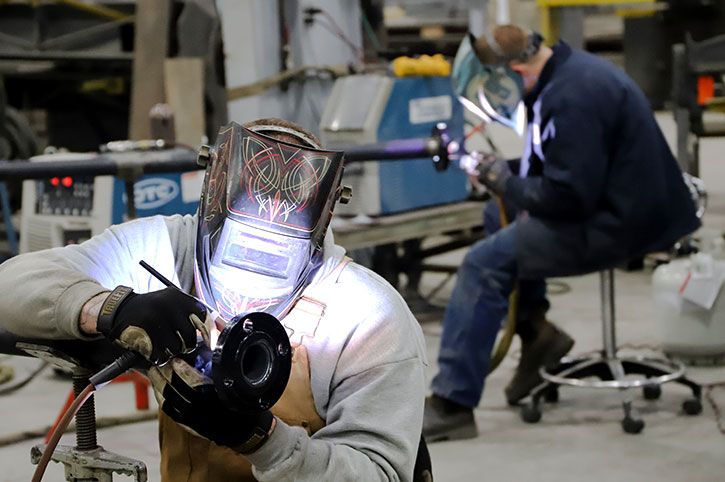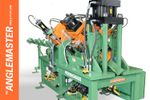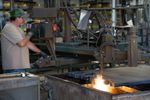Merriam Webster defines quality control (QC) as “an aggregate of activities (such as design analysis and inspection for defects) designed to ensure adequate quality especially in manufactured products.” From a fabricator’s point of view, QC boils down to a simple premise: Dotting every “i” and crossing every “t” during each step of the metal fabrication process to ensure the final product meets or exceeds the customer’s expectations.
When sourcing a new fabrication partner, look for a vendor who can show you an official, in-house quality control program. While many vendors talk about quality, not all possess the QC resources to “walk the talk.”
Here are five ways a documented quality control system can deliver a true return on your custom metal fabrication investment.
1 — Safety
It may seem like common sense to say that a standard, consistent fabrication process results in quality. But consistency, combined with regular testing, ensures both quality control and safety. For example, a custom metal staircase for a bulk storage solution requires diligent QC to ensure safety.
If the inward stringer of a metal staircase isn’t always mounted correctly, the arc to the outer stringer may not be tight enough. This could present a significant safety hazard if the staircase doesn’t hold. Your metal fabrication partner should be well-versed in OSHA rules and have the expertise to calculate your industrial stairs at the beginning of the design process. They should also have a QC chain of command to ensure consistency and OSHA compliance during every step of the project.
From design to installation, regular quality control checks are key to identifying process flaws that could lead to injuries. These QC checks may include:
- Engineering a design based on safety regulatory standards.
- Reviewing the design with the customer and the metal fabrication team to make sure everyone’s on the same page.
- Ordering materials that satisfy applicable OSHA codes and quality standards, such as material thickness, ASTM specification, etc.
- Maintaining performance qualification files for each welder, tacker, and welding operator.
- Making sure each completed piece is properly handled, stored, or shipped to prevent damage that could lead to a safety hazard.
2 — Cost Control
The same metal fabrication QC measures that ensure safety are critical to controlling costs. Just one lapse in the process can lead to lost productivity from an injury or OSHA fines. Implementing quality control early in the process prevents mistakes and avoids costly downtime and material handling expenses.
But how do you determine if a QC program is cost-effective? You may want to ask your potential fabrication partner the following questions to ensure they’re following quality control best practices:
- Do they offer full transparency, including their fabrication field installation process?
- Do they maintain tight quality control over all fabrication materials, labor, and management?
- Do they document their progress throughout the fabrication process, including photos?
Ask your potential partner to provide their quality control policy or documentation, to be sure they are following best practices.
3 — Compliance
When a potential partner claims to be “compliant” for metal fabrication, make sure they practice what they preach. Do they adhere to industry standards, such as ASME Section 9 and the American Welding Society AWS D1.1? Can they properly handle safety reports and OSHA requirements? Do they effectively cover OSHA requirements in their QC policy?
For example, OSHA requires staircases for compliant access to certain types of industrial equipment. Your partner should be able to fabricate the appropriate industrial access solution to work with your facility’s layout or complement your existing bulk storage. Make sure they can calculate the tricky OSHA-compliant dimensions for industrial access equipment, while meeting your facility’s exact specifications.
4 — Consistency
Are you and your potential metal fabrication partner on the same page? Communication between customer and metal fabricator is key to quality control, which in turn ensures consistency. When both parties understand the expectations of the final product, the partner can set the QC standards.
Is your partner in sync with the precision and accuracy needed to ensure your final product functions as it was intended? Will the fabrication process ensure consistency and reliability? Finally, do they emphasize the importance of collaboration early in the design phase, and can they provide you with detailed documentation throughout the process?
5 — Reputation
When your company’s reputation could be on the line from any number of potential risks during manufacturing operations, quality control in the fabrication process is a critical component to ensuring your industrial equipment remains safe, compliant, and productive.
Only an established QC program can ensure your metal fabrication partner can cost-effectively deliver what they promise. Does your partner have a quality control manual? If so, make sure they regularly update the manual to keep their staff, materials, and machinery compliant with regulatory demands.
In the very least, your partner’s QC manual should include inspection policies for drawings and specifications, welding procedures, welder qualifications, materials, inspections, and handling, storage, and shipping of fabricated equipment.
Sourcing a Metal Fabrication Partner Well-Versed in Quality Control
At Southern Metal Fabricators, quality control is integral to how we approach every project, from regularly updating our QC manual in accordance with industry standards, to innovating new ways to improve our QC procedures. By opening the lines of communication, we work with our customers to combine our quality processes for each custom metal fabrication.
Quality control minimizes liability and risk. Our documented QC system can prevent mistakes before they occur, ensuring ROI and helping you protect your operation and reputation.
If you’re ready to partner with a true full-service fabricator who can help you meet and exceed quality control expectations, give us a chance to say, “Yes, we can do that!” by contacting us today.





